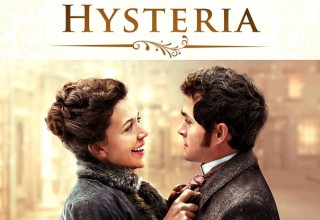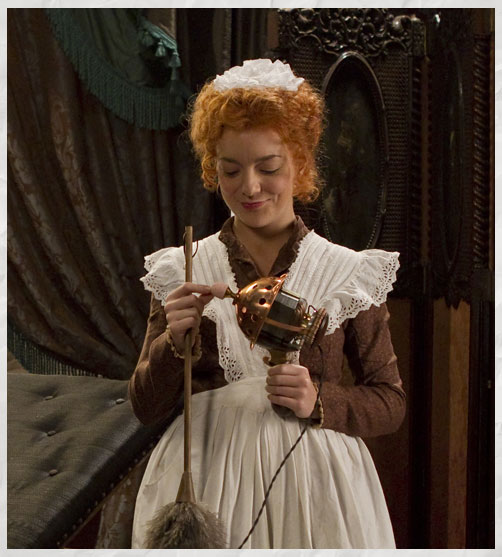I recently attended a showing of the movie Hysteria. Hysteria is a Sony Classics movie about the invention of the vibrator. Considering the
movie itself is set in the UK, it seems a shame we are one of the last
countries to show it in our cinemas. I was excited to get a chance to see it
before its official launch, and had been eagerly awaiting the press event. I
felt I should research the topic a bit prior to the showing, so I had some idea
what to expect. Sadly, after much research, I’m still unsure about the whole truth
of the story behind the invention of the vibrator. What I did gather was that
the story portrayed in the movie Hysteria is mostly fictional.
Cast:
Hugh Dancy as Mortimer Granville
Maggie Gyllenhaal as Charlotte Dalrymple
Jonathan Pryce as Dr. Robert Dalrymple
Felicity Jones as Emily Dalrymple
Rupert Everett as Edmund St. John-Smythe
Sheridan Smith as Molly
The film portrays technological innovation in a hilarious
way, and both Hugh Dancy’s and Rupert Everett’s characters are entertaining and
witty. As characters go, although Dancy played the lead role of Granville well,
I preferred the character Smythe. There was one scene where he is on the
telephone to his mother about vibrators that particularly endeared him to me.
I found Jones’s
acting good, but the character of Emily felt too plain and lifeless; I
understand that Emily was meant to embody the traditional ideal of a Victorian
woman, but I just found her far too dull. Sheridan Smith brought a little more
fun into the movie, acting as the feisty red head Molly, the Dalrymples’s maid
who used to be a prostitute. I found that Maggie Gyllenhaal was the one who
really excited me; her confident portrayal of the headstrong feminist Charlotte
injected some life into the movie, as well as acting as a positive role-model
for women.
I did enjoy the movie. I felt that its story was easy to
follow, however I also thought that there could’ve been a little more bulk to
the story of the relationship between Granville and heroine Charlotte. I think
most people who are looking for a fun period rom-com will find it a light-hearted
laugh, but just don’t expect to find any truth in the story.
On that note, let’s take a closer look at what my research
uncovered.
Hysteria was a term used to describe a condition where women
showed any form of physical or emotional weakness that, at the time, were not
otherwise explained by medical science. It could be attributed to an overenthusiastic
attitude, showing systems of boredom, panic, nymphomania, anaemia, mammary
gland tumours/swellings, twitching, or even possession. It was almost
exclusively applied as a label to women, and the uterus was considered the
prime cause, sometimes being referred to as ‘the wandering womb’. Treatment for
hysteria throughout time has ranged from prescriptions of wine, bed rest,
starvation, leeches, acid burning of the genitals, lobotomies, ovariotomies, institutionalisation
(into an asylum),and various other gruesome practices. One other treatment was
referred to as pelvic massage, which was essentially stimulating the female
genitalia. Eventually the use of vibrators was incorporated into treatment after
doctors complained of manual fatigue.
Mortimer Granville and Edmund Smythe did not invent the
first steam powered vibrator, as depicted in the movie. Apparently the first mechanical
vibrator to be invented was a wind-up device, developed in France around 1734. The
first steam powered vibrator was made by George Taylor in 1869.
Dr Granville claimed the rights to the invention of the
electrical vibrator in 1880 as a treatment for fatigue and other ailments, and
not hysteria. Andrew Scull’s book Hysteria suggests Granville was a doctor in
an asylum who performed surgeries such as ovariotomies to treat hysteria, and
referred to those who fell under the need for this treatment as in a state of
‘’Mazeland, Dazeland, and Driftland.’’ In the movie they portrayed Granville as
a man who wanted to avoid this form of treatment at all cost, but in Rachel Maine’s book The Technology of Orgasm, Granville himself is quoted as saying he
was against the use of vibrators for the treatment of hysterical women. All the
information I’ve found sugcgests that Granville was mostly in it for the money
(see Scull’s book), and not the modern, ethical doctor portrayed in the film.
So far I haven’t found any evidence stating that the
Dalrymple family and Edmund Smythe really existed. If someone else has any information
regarding them, let me know.
The vibrator in the film is called the Jolly Molly, but after
much research I haven’t found anything backing it up. All I have found out is
that this name has been trademarked by Cal Exotics sometime early in 2012.
Synopsis (contains spoilers):
Mortimer Granville is a man of science, who finds himself
applying for a job under a prosperous and respected doctor, known as Dr Robert
Dalrymple. Dr Dalrymple specialises in the treatment of hysteria via manual
stimulation, and all the rich and wealthy women flock to his surgery. After successfully
getting the job, Granville moves into the Dalrymple household, and is soon adopted
into the family. Dalrymple has two daughters; one still living at home, who is
passive, plain and womanly, known as Emily, and the other daughter Charlotte,
who lives away from home and is boisterous, argumentative, and fights towards
equal gender rights. Naturally, Granville starts to fall for Emily, purely
because her father feels they are best suited to one another. They start
courting – it is pretty standard and a bit dull, but then Charlotte comes galumphing
onto the scene and livens things up. At first Granville rejects her, until one
day they show a common interest in helping people and educating them about
germs and sanitisation.
One day Granville’s services disappoint one of the rich and
wealthy women attending Dr Dalrymple’s clinic, resulting in him being forced to
leave. Granville seeks comfort at a friend’s house, known as Edmund St. John-Smythe,
who is a wealthy inventor and news writer. Smythe is currently busy inventing a
steam powered feather duster, which Granville starts to mess about with, and
finds it is able to treat his chronic repetitive strain syndrome, due to its
vibratory effect. They find a willing test subject, a former prostitute known as
Molly the Lolly, and discover they have invented the first external vibrator to
cure the ailment known as hysteria.
With this revolutionary product, Granville is welcomed back
into the Dalrymple family. An engagement between him and Emily is arranged, and
all seems well until Charlotte hits the scene again. Charlotte gets arrested
due to her hysterical behaviour, and Granville is forced by her father to
testify in court on her behalf, stating that she is hysterical. However he does
the honest thing, and gives testimony that she is not hysterical, saving her
from a painful procedure involving an ovariotomy. Charlotte is sentenced to a
month in prison; during this time the first electrical vibrator is invented,
called the Jolly Molly, granting Granville riches and fame. He decides to
follow Charlotte’s dream of setting up an educational facility. He meets Charlotte
as soon as she is released from gaol, shares the news of his new investment, and
promptly proposes to her.




No comments:
Post a Comment